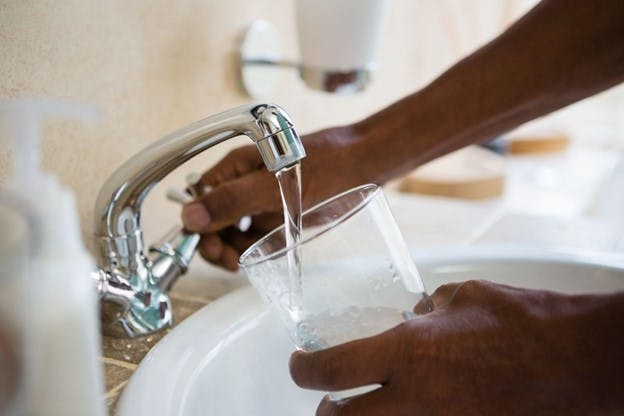Refer-A-Friend: Earn up to $200 for Yourself and a Friend When They Sign-up with HomeWater. Learn More
April 2024
The Complete Guide to Kansas City Water Quality
Key Takeaways
- Kansas City gets its drinking water from the Missouri River and treats it to comply with the Safe Drinking Water Act (SDWA) and EPA guidelines.
- However, it contains 10 contaminants that exceed the recommendations of the Environmental Working Group (EWG).
- Kansas City’s tap water is moderately hard depending on the season and the conditions of the river.
- Residents can use a water softener or a home water filter to improve the taste and quality and Kansas City Water.
Kansas City, Missouri, is known for being a City of Fountains: It has over 200 fountains, many of which were originally built for people — and their horses — to drink from. Now, Kansas City residents get drinking water delivered straight to their tap from KC Water. But how clean is the tap water in Kansas City and is it safe to drink?
Here’s everything residents and visitors need to know about Kansas City water quality, including where it comes from, which contaminants to watch out for, and which home water filters are best for making sure it’s safe to drink on a daily basis.
Where Does Kansas City’s Tap Water Come From?
The City of Kansas City (KCMO.gov) has multiple water sources. Its tap water mostly comes from the Missouri River, the second-longest river in the U.S., which flows from the Rocky Mountains in Montana and into the Mississippi River.
It also gets some of its water from groundwater wells and other regional water systems. Around one-fifth of Kansas City's water comes from alluvial wells, which are recharged by surface water from the Missouri River.
Kansas City’s tap water is delivered by KC Water, which treats up to 100 million gallons of water per day and supplies it to over 500,000 residents.
KC Water also handles several wastewater treatment plants and oversees stormwater management. They operate 600 miles of pipes and 14 miles of flood walls and levees. After it undergoes treatment, wastewater is released back into the Missouri River.
Is the Water Hard or Soft in Kansas City?
Drinking water can be either hard or soft depending on how many minerals it contains. These minerals don’t affect drinking water safety, but they can affect its taste, which is why some consumers use a water softener to improve its taste and appearance.
The City of Kansas City has moderately hard water depending on the time of year, since seasonal changes can affect the water supply. Variations in snowmelt, runoff, and river levels can result in more silt or organic matter in the water, which KC Water aims to reduce during the water treatment process.
According to the Missouri Department of Natural Resources, the water quality from the alluvial system is “generally very good,” with 20-750 milligrams of total dissolved solids, although it does contain relatively high quantities of iron and manganese.
How Is Kansas City’s Drinking Water Treated?
Kansas City’s drinking water goes through a multi-step treatment process to ensure that it complies with the Safe Drinking Water Act (SDWA) and meets the latest guidelines of the U.S. Environmental Protection Agency (EPA). These steps include:
- Intake: KC Water pumps water directly out of the Missouri River and screens it for mud and debris before sending it to the treatment plant.
- Sedimentation: Sediment and other debris are left to settle at the bottom of the water tanks so they can be removed, sometimes with the help of chemicals.
- Disinfection: The water is disinfected with chlorine to kill viruses and bacteria. It’s also softened with lime to remove any unwanted tastes and odors.
- Stabilization: Carbon is added, the lime is removed, and the pH is adjusted to reduce the likelihood of corrosion while it moves through the pipes.
- Filtration: The water is filtered through 27 inches of sand to remove calcium carbonate and any other unwanted matter that remains.
- Distribution: Finally, KC Water adds fluoride before distributing the water via a system of four pump stations and 2,800 miles of pipes.

What Contaminants Are Found In Kansas City Drinking Water?
Local water utilities are required to release a water quality report every year to inform consumers about any contaminants found in their drinking water. The 2022 report on Kansas City water quality determined that KC Water complied with state and federal regulations and that “no violations of drinking water regulations occurred.”
However, some organizations call for stricter recommendations and lower levels of contaminants in drinking water. The Environmental Working Group (EWG) found 10 contaminants that exceed their public health guidelines, including the following.
Total Trihalomethanes (TTHMs)
Four chemical byproducts that arise during the water disinfection process — chloroform, bromoform, bromodichloromethane, and dibromochloromethane — are known as total trihalomethanes (TTHMs). Kansas City’s TTHM levels meet the EPA’s guidelines, but these disinfection byproducts are associated with an increased cancer risk.
The EWG recommends a maximum of 0.15 parts per billion (ppb), which Kansas City water exceeds by 51 times:
- EPA maximum allowance: 80 ppb
- EWG recommended maximum: 0.15 ppb
- Kansas City maximum contaminant level: 7.70 ppb
Haloacetic Acids (HAA5)
Haloacetic acids (HAA5) are another group of disinfection byproducts associated with cancer. This group includes monochloroacetic acid, dichloroacetic acid, trichloroacetic acid, monobromoacetic acid, and dibromoacetic acid. The EPA’s upper limit is 60 ppb, which is four times higher than the maximum contaminant level in Kansas City.
However, Kansas City water exceeds the EWG’s recommendation by 162 times:
- EPA maximum allowance: 60 ppb
- EWG recommended maximum: 0.1 ppb
- Kansas City maximum contaminant level: 16.2 ppb
Haloacetic Acids (HAA9)
Haloacetic acids (HAA9) include the five acids listed above, plus four more. There’s no legal limit for HAA9 as an entire group, but the EWG recommends keeping them under 0.06 ppb. Kansas City’s HAA9 levels are 279 times higher than this amount, indicating an increased cancer risk with long-term exposure:
- EPA maximum allowance: No legal limit
- EWG recommended maximum: 0.06 ppb
- Kansas City maximum contaminant level: 16.8 ppb
- Chromium (Hexavalent)
Chromium-6 (hexavalent) made headlines in the 1990s when it was the subject of Erin Brokovich’s infamous court case in Hinkley, CA. The California Office of Health Hazard Assessment set a limit of 0.02 as a public health goal, but there’s no national standard enforcing an upper limit for American utility providers.
The level detected in Kansas City’s drinking water is 2.53, which is 126 times higher than the EWG’s recommended maximum:
- EPA maximum allowance: No legal limit
- EWG recommended maximum: 0.02 ppb
- Kansas City maximum detected level: 2.53 ppb
- Nitrates and Nitrites
Nitrates and nitrites are two contaminants associated with agricultural runoff and urban pollution. When they make their way into drinking water, these chemicals can raise the risk of certain cancers, and even cause oxygen deprivation in babies. Kansas City’s nitrate and nitrite levels exceed the EWG’s recommendations by 15 times:
- EPA maximum allowance: 10 ppm
- EWG recommended maximum: 0.14 ppm
- Kansas City maximum detected level: 2.13 ppm

Does Kansas City Drinking Water Contain Lead?
According to KC Water, there’s no lead in Kansas City drinking water when it enters or moves through the distribution system. Lead can enter your tap water through:
- Lead service pipes installed until the 1950s
- Galvanized plumbing installed until the 1960s
- Copper pipes installed prior to 1968
- Some brass faucets and fixtures
KC Water takes anti-corrosive measures to reduce the amount of lead and other metals leaching out of pipes, but if you suspect you may have lead plumbing in your home and are at risk of exposure, call the 311 Action Center at 311 or (816) 513-1313.
In the meantime, use cold water for drinking and cooking, and use a water filter rated NSF 53, which means it’s certified to remove lead from tap water.
Is Kansas City, Missouri, Water Fluoridated?
Yes, Kansas City voters chose to add fluoride to their drinking water in 1980. This is a public health measure intended to reduce the incidence of tooth decay.
KC Water maintains fluoride levels of around 0.62 ppm, which is less than the EPA’s maximum contaminant level of 4 ppm.
How Often Is Kansas City Drinking Water Tested?
Kansas City water quality is regulated by the Missouri Department of Natural Resources (DNR), which requires KC Water to perform a wide range of tests throughout the year. These include source water assessments and unregulated contaminant monitoring.
KC Water tests the water supply for microorganisms like cryptosporidium, as well as for contaminants that aren’t a public health risk, such as chloride and sulfates. KC Water will release an advisory if consumers need to boil their water or drink bottled water.
The frequency of testing depends on the specific contaminant, and an annual Kansas City water quality report is released once a year. Customers who want to test their tap water more frequently should buy a home testing kit or contact a certified lab.
Which Water Filters Will Improve Kansas City Water Quality?
Whether you’re concerned about contaminants, or just want to improve the taste and appearance of your tap water, buying a home water filter may be a good option. But which types of filters are the best fit for Kansas City water?
If you’re primarily concerned about taste, consider an activated carbon filter. These filters absorb chemicals like chlorine, but leave behind beneficial minerals.
If you want to filter out nitrates and nitrites, heavy metals, and total dissolved solids (TDS), consider a reverse osmosis system. These filters use a semi-permeable membrane to remove up to 99.9% of organic and inorganic materials.

Is Kansas City Tap Water Safe to Drink?
Kansas City water quality generally meets the requirements of the EPA and the Safe Drinking Water Act. However, some contaminants, like HAA9 and chromium-6, don’t have a legal limit, and the Environmental Working Group (EWG) recommends lower limits for other contaminants that the EPA currently requires.
Kansas City residents who are concerned about specific contaminants, or just want to improve the taste and appearance of their water, should consider using a water filter. Whole home water filters like the UPSTREAM™ 4-Stage Whole Home Water Filter remove chlorine and other contaminants before they ever reach your tap!